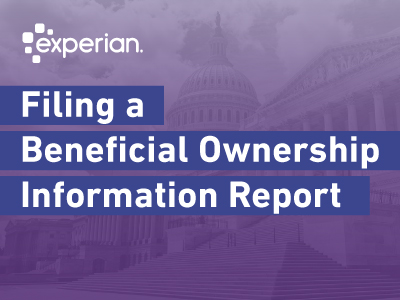Latest Posts
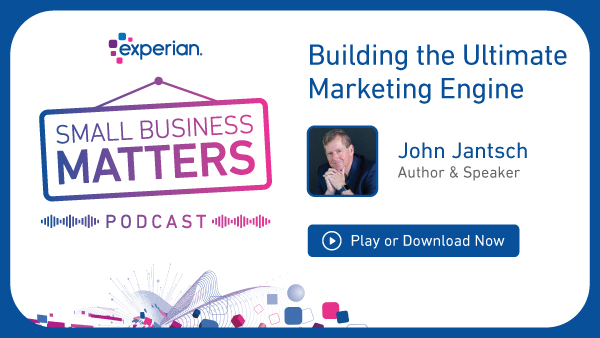
Small business author and speaker John Jantsch shares insight on building the ultimate marketing engine for your business.
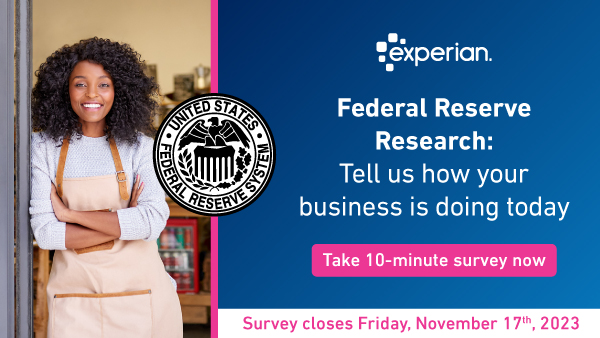
At Experian, we understand the vital role small businesses play in our economy. They are the backbone of innovation, job creation, and community growth. That's why we're encouraging our readers to take the Federal Reserve Banks' annual Small Business Credit Survey for small business owners and the self-employed. Why Your Voice Matters This 10-minute survey is a crucial tool for understanding the challenges and opportunities faced by small business owners and self-employed people in the United States. Small businesses like yours often face unique financial hurdles, and this survey is your chance to share your experiences. Whether it's sharing your stories of accessing credit, managing cash flow, or navigating economic uncertainties, your insights can make a difference. Experian's Commitment to Small Businesses Experian is dedicated to empowering small businesses by providing access to valuable financial insights and resources. We believe that by working together, we can help small business owners thrive in a dynamic marketplace. We are proud to promote the work of the Federal Reserve Banks as one way we're actively involved in supporting the small business community. How You Can Help We encourage all small business owners and self-employed individuals in the United States to take part in the Small Business Credit Survey. Your input is invaluable in shaping the future of small business credit and financial support programs. Take the Survey
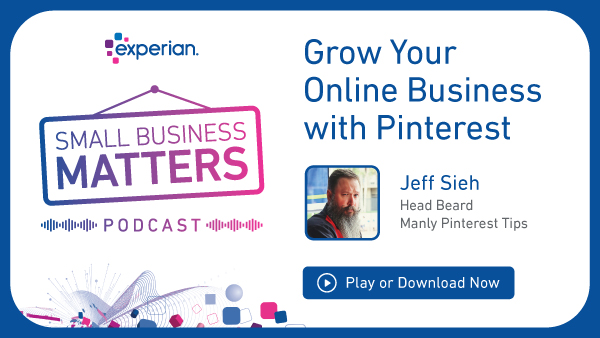
People on Pinterest are 30% more likely to purchase things because they're shoppers. Learn how to harness the power of Pinterest for business marketing in this podcast interview with Jeff Sieh.

Separating business and personal finances is not just an option, it's a vital step towards safeguarding your assets, building a strong credit foundation, and gaining control over your business's financial health.
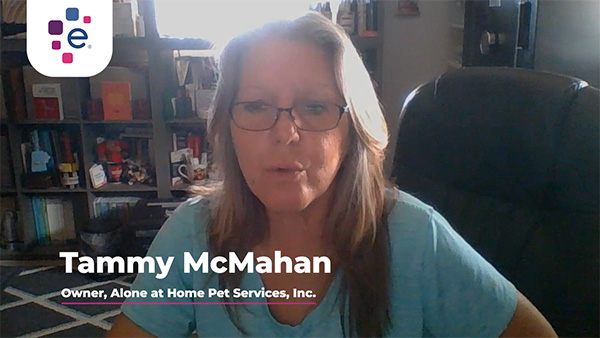
In this customer story we hear from a business owner who protects her identity and credentials.
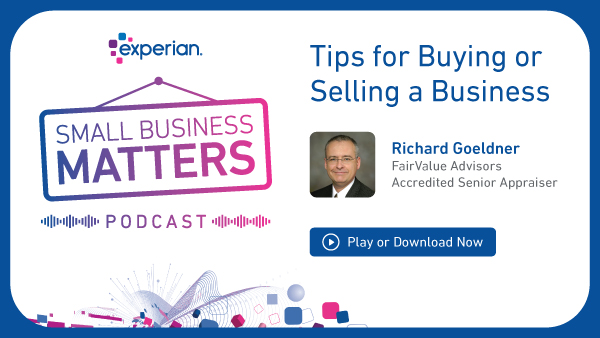
With so many small businesses being bought and sold, and record numbers of people quitting jobs and starting new businesses, we thought it would be a time to sit down with an accredited expert on business valuation and dig into the art and science of placing an accurate value on a small business. In this episode of the Small Business Matters podcast, Richard Goeldner from FairValue Advisors shares his expertise. What follows is a lightly edited transcript of our talk. [Gary]: If you were thinking of buying or selling a business, 2022 is shaping up to be very busy. According to BizBuySell's Insight Report, a leading resource that tracks and analyzes businesses for sale. The number of businesses being bought in Q1 2022 grew by 24% over the previous year; this watermark comes in just 3.7% shy of Q1 2019 before COVID-19 shocked the market. The market of buying and selling businesses has been rising at a steady pace since dropping 39% in Q2 2020. Whether you're buying a business or selling a business, value matters. So, for this small business matter, we will be speaking to Rich Goldner. He's an accredited senior appraiser who has provided valuation advisory services since the early nineties, and he specializes in the valuation of privately held companies and intangible assets. Rich has worked with a wide range of companies from fortune 500 companies, family businesses, as well as private equity firms, M&A firms, and the IRS, and made numerous public appearances on the topic. His writings on business valuation issues have been published in local business journals and the business valuation review. Rich, welcome to the small business matters podcast. [Richard]: Thanks, Gary. Thanks for having me on. [Gary]: Well with so many people taking the opportunity to quit their day jobs during the pandemic. Are you seeing people buy businesses or do you think they're starting their own? [Richard]: I think I'll say it's a tough question. I certainly believe that they're buying businesses, you know, starting businesses in this environment. Certainly, I think has been a challenge particularly given the economic conditions, although as you cited earlier, you know, the conditions are improving in terms of business transaction activity. [Gary]: For a small business owners listening and who are considering selling their business. What are some of the biggest mistakes that you see business owners making prior to a sale? [Richard]: With business owners, I would say a lack of preparation is probably the biggest mistake in many smaller businesses. The business is so dependent upon the owner, and if there isn't a second level of management, a middle management, the risk to the buyer can be quite significant because once that business is purchased, you know, are the customers going to stay are the employee is going to stay? And oftentimes that owner is the glue that makes that business really stick. So, putting plans in place and building out your management team well prior to selling your business, I think can certainly pay dividends. Another area is customer dependence. If you have a business that is dependent upon one or two customers for you know, 30 to 50% of your revenue, that's going to be viewed as significant risks to a potential buyer. [Gary]: So, you want to really be building that business so that it can be assumed by somebody else. You don't really want to have yourself so entangled with it that it's going to fall apart whenever the sale is made. Is that what I'm hearing? [Richard]: Exactly. Exactly. And with those risks that translates into a lower price multiple, and a low, usually a lower offer for the business or some kind of an earn-out where the owner is obligated to stay on for a longer period of time to ensure a smooth transition. And of course, many business owners, the reason they're selling their business is they don't want to do it anymore. So again, it can be a little problematic. [Gary]: When I watch Shark Tank, as I'm sure you have, the sharks always mention this formula for calculating business value. Can you explain that to us a little? [Richard]: Sure. Yeah. I love shark tank and you know; I think one of the price multiples that they will bat around on the show is a multiple of revenues. And sometimes the numbers are really, high, like, you know, 20 times revenue, and, you know, most smart investors like the sharks, they're not buying revenues. You can't put revenues in your pocket. Investors are buying, you know, the profits or the future cash flows of the business. And on Shark Tank, you'll see that the sharks are jotting down notes in their little black notebooks, their little note pads. And we don't get the benefit of seeing exactly what they're thinking or what they're jotting down, but they're probably estimating how long it's going to be until those businesses become stable and earn profits. And they're looking at discounting what that value might be for the risk and the amount of time needed to get that business to stabilization. Now, the example that I just went through is for a business that's young and a lot of the businesses on Shark Tank are very young businesses. There are times when a more mature business will come on Shark Tank for various reasons. And you'll note that at that point, the sharks are talking about a multiple of profits EBITDA, for example, which is earnings before interest tax depreciation and amortization, it's a profit measurement, and they'll be talking about a multiple of earnings. And that's more common in the valuation of businesses and in the sale of businesses. Again, unless you're talking about ones that are more of a startup, of course, also with the sharks, the sharks know that they have the backing of, of their name and their experience. So, the businesses that they're investing in, you know, generally have a greater chance of success as well. [Gary]: Yeah. So, so what methods, when, whenever you go into value of business or appraise a business, what methods are a commonly used? [Richard]: Sure. There are three approaches really, which are like the approaches that are used in real estate appraisal. The first is a cost or asset-based approach, which estimates what the business would be worth if liquidated. Think of the going out of business sale, you know, turn out the lights, the party's over. This approach gives very little value or no value to the good will of the business or the intangible assets like name, reputation, customer relationships, you know, the existing personnel. So, the cost approach is typically appropriate for businesses that are in financial distress, where a buyer simply isn't going to pay more than what the hard assets are worth. So that's approach. Number one. The second approach is a market approach. And we were talking about Shark Tank and multiples of revenue or profits. And that type of approach is a market approach where you're estimating the value based on comparing the business to similar businesses that have sold. And this is frequently called a price multiple. Again, multiple profits, which is more popular than a multiple of revenue. And then the third approach is an income approach, which estimates the value by basically estimating the future profits and cashflow of the business in the future. How much could this business make annually? And then discounting those cash flows to a present value based on the risk involved in achieving those expectations. And with this approach, I would say, think of a time value of money concepts. For healthy businesses, that market approach and that income approach are going to be the most frequently used. And of course, finding good data about businesses that have sold can be challenging. So, the market approach can be a little difficult at times. You could say that businesses that are unique can be very valuable, but businesses that are unique will probably not have very many comparable businesses that have sold. [Gary]: So, what drives the value of a business? [Richard]: I see really six factors that drive the value of a business. One is revenue growth. You know, you must have revenues to get the profits, right? [Gary]: Yes. [Richard]: And profit margins, are they stable or improving? This is when I say profit margins. I mean, as a profits, as a percentage of revenue, is that stable or improving over the years? Asset utilization or asset usage. That's our third key factor. You generally must reinvest more of your profits in asset intensive businesses. These would be businesses that have perhaps a lot of machinery or equipment that needs to be replaced frequently. Those will tend to have a lower price multiple because you're not able to take out as much of the profit into your pocket each year. And then there is a debt leverage. You know, some business owners are very aggressive with the use of debt. They have too much of it. And some business owners elect not to use that very much. And so, for those that are very light on debt that increases business value. And of course, those that have a real high debt level, you know, the value of the business is going to be lower. And then there is a business risk. This goes back to our conversation earlier about key person dependence or customer dependence. Those are examples of business risks that will impact value. And the last one we really don't have much control over and that's market conditions. Are we operating in an economic recession or perhaps in a growing economy? So clearly, you know, having lived through the COVID recession and I realize COVID is still with us, but you know, the economy has certainly bounced back, but you know, market conditions and the timing of that is really a factor that impacts value, but we really don't have that much control over it. [Gary]: Yeah. Marcus Lemonis from "The Profit", he appears to have a sixth sense when it comes to valuing businesses, he's looking to invest in, what do you think we could learn from him? [Richard]: I love Marcus, I love the show. He preaches People, Process and Product. And when he goes in to look at a business, usually one or more of those three issues, one or more are broken, either the people, the process, or the product. And if one of those three is broken, it depresses profits. And obviously you end up with a business that could be in distress. And that's where Marcus comes in. So, in many cases, Marcus finds the people relationships to be broken in some way. And so, in many of his shows, you'll see, he's trying to sort out the dynamics between family members and between employees to see what the problems are from a people perspective. And to see if he can fix those. Sometimes he finds processes that are inefficient or inconsistent where the quality, you know, just isn't there every time. And of course, he also looks at products to see whether those products are serving the customer's needs in a good way. And so I like his people, process, product mentality. [Gary]: Yeah. He seems to approach things with a great deal of empathy. I mean, when he's having those hard conversations with the owners or partners, he has a way of just putting things out there in a plainly spoken way. He isn't afraid to have the hard conversation and keep it real. And I love the show too. I think we could all learn a lot from, from him just by watching. [Richard]: I'd say it's amazing how he's able to diffuse situations. He really, really does a great job. [Gary]: So, you've been involved in valuating businesses and appraising businesses for some time. Is there a business that stands out to you maybe as the most interesting or most unusual that you had your hand in a buying or selling? [Richard]: The most interesting? Boy I've had several. I'm going to go back to one that was very early in my career, a business where the owner died and the son inherited the business and he was an attorney, the son, and he wanted to go to seminary to become a priest, an Episcopal priest. And he hadn't shared that with his father before his father died. And this business has landed in his lap, and he didn't really know much about the business or how to run it. And so, for about a year after his father died, we watched the business just gradually decline. And it was very sad to see. It was a company that specialized in cleaning manufacturing equipment in a particular sector. And so, I found the niche to be very interesting in terms of the type of business it was, but it was really the story of what happened to that business that stands out the most me. And what I didn't know at the time is they had obviously failed to plan the exit. And nowadays exit planning is very popular. That term is bounced around, but exit planning is something that's been around probably ever since there's been a business, but a lack of planning can damage the business and what you're able to get out of it. And so that's, that's why I think of that one situation. [Gary]: Wow, that's interesting. My sister-in-law was going to take over a business, a shoe repair business for her father, and she did it for some time. She was taking real estate classes at the time, but she was known as the Huntington Beach Shoe Lady. Her business cards had the shoe, "The Lady That Lives in a Shoe", but in the end it was not a fit for her really for environmental reasons because California was changing the regulations on the glues that you can use to repair shoes. And those types of things just became a very regulatory, I guess, risky place for her to be operating. And she got her real estate license and has now got a thriving real estate career. So sometimes the business, you know, just may not be the right fit for a variety of reasons. [Richard]: Absolutely. And the example you gave, one of the major business risks was a regulatory risk. [Gary]: Yeah. So, any closing thoughts for small business owners contemplating selling or, or buying a business? [Richard]: Sure, sure. I would say, for many owners, your business is your most asset, but you won't find the value of your business listed on your brokerage account statement. And so, if the real value of your business matters to you, I recommend investing in getting a business valuation, a formal business valuation so that you know where you stand and you can do that well in advance of selling your business. You don't need a business broker if you're looking at selling in, three to five years, but you might want to know where you stand now so that you can look at ways to improve the value of your business over the next few years, as you prepare to sell. [Gary]: Excellent advice, Richard Goeldner, where can people learn more about you? [Richard]: Well, simply search for FairValue Advisors online. You'll find our website. [Gary]: Awesome stuff, Richard, thanks so much for coming on Small Business Matters and sharing your knowledge with us we really appreciate it. [Richard]: Thank you so much. I've enjoyed it.
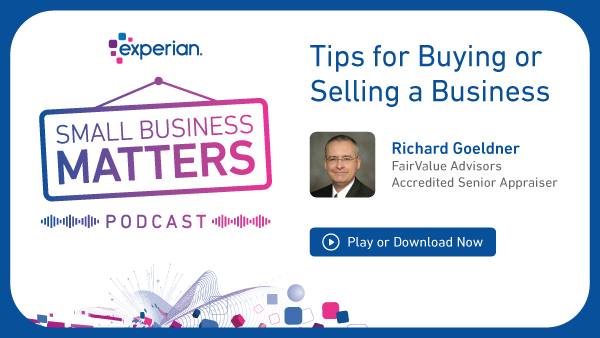
If you are buying or selling a business any time soon, you will want to listen to this podcast about buying or selling a business.
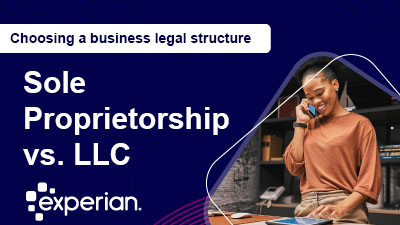
This article provides information on the different factors to consider when you are choosing between a sole proprietorship vs. LLC.
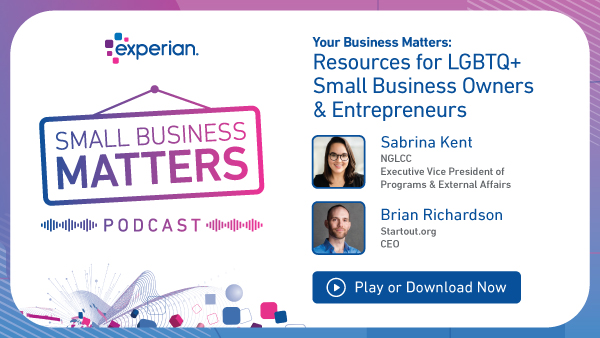
We are celebrating Pride this month at Experian, and today’s episode focuses on resources available to LGBTQ+ small business owners and entrepreneurs. Every business owner faces challenges, whether they’re just starting out or have been in business for years. But statistics around access to funding, representation and business health indicate that LGBTQ+ small business owners can face additional unique challenges as part of a marginalized community. Our two guests are from national organizations that work to level the playing field for LGBTQ+ folks in business, and we’re eager to share their work with you. Whether you are a seasoned small business owner or a budding entrepreneur, join us as we dive into the world of LGBTQ+ entrepreneurship and uncover an array of resources available to support your business journey. Ten Takeaways – action items you can do right now as an LGBTQ+ small business owner or entrepreneur to help your business During the episode, we compiled a list in real time with our guests of things our listeners could do right away to help their businesses. Here are those resources as promised: Visit NGLCC's website to learn about resources for your business. Learn about certification through the NGLCC and decide if it's right for your business. Join your local chamber. Visit StartOut.org and join; learn about resources on that site. Check your business credit report. Download Experian's Blueprint for Establishing and Building Business Credit Check out resources from the SBA specifically for LGBTQ+ small business owners, including free local business coaching look up resources at SCORE, including webinars, mentoring, networking events and workshops (all free) Check out this list from EveryQUEER of grants designed just for LGBTQ+ entrepreneurs Interested in venture capital funding? How about this list of VC funding specifically for queer entrepreneurs. What follows is a lightly edited transcript of our interview: Emily Garman: Welcome to Experian's Small Business Matters podcast. I'm Emily Garman. My pronouns are they and she and I'll be your host today. Happy Pride Month to all our listeners. Today we have two guests. Each has a wealth of information to share specifically for LGBTQ+ small businesses and entrepreneurs. I'm really pleased to welcome our guests. We have Sabrina Kent, the Executive Vice President of Programs and External Affairs for the National LGBT Chamber of Commerce, which we'll refer to as the NGLCC. You might remember Sabrina from last year's Pride Month podcast about inclusion in the workplace; that was a great episode that's worth another listen again this year. We're also joined by Brian Richardson, the new CEO of startout.org. He just joined startout.org a few months ago, but this organization has been working since 2009 to make sure that LGBTQ+ entrepreneurs have the support and resources they need to fairly compete in today's business world. Sabrina, can you talk a little bit about the NGLCC and what resources and benefits your organization offers to LGBTQ+ small businesses & entrepreneurs? Sabrina Kent: Yeah, Emily, thank you so much. So first and foremost, we're a certification organization and you might be asking yourself, what is certification as an LGBTQ owned business? And those are businesses that are 51% or more owned, operated and controlled by an LGBTQ person or persons. And that certification grants them access to contracting opportunities. With our corporate partners, we work with about 450, mostly Fortune 1000 firms who accept our certification and want to include LGBTQ vendors in their supply chain. So first and foremost, certification is our primary product. But outside of that, we believe that we need to educate our business owners, help them grow, scale, provide them with resources and opportunities to be able to meet that corporate contract. So whether that means you opened your doors yesterday, or you're a well established business, there's an opportunity and a resource for you in the NGLCC network to help you get connected, contract with corporations and with one another to grow your companies. Emily Garman: Great. Brian, can you tell us a little bit about startout.org? Brian Richardson: Absolutely. And thanks for having me today too. I really appreciate it. So Start Out, as you mentioned, we started in 2009 to really help LGBTQ+ entrepreneurs get the resources, networks, information, and knowledge skill they need to turn their business ideas into a reality. You mentioned the 4% of small businesses are owned by LGBTQ folks. If you look in those numbers a little deeper and specifically look around high growth startups and entrepreneurs over the last 20 years, $2.1 trillion have been given to Founders and entrepreneurs in VC funding. Of that $2.1 trillion, which is a massive amount, only 0.5% has gone to founders who openly identify as LGBTQ+. So it's an even smaller number, and what our goal at Start Out is, is to really help make sure that those LGBTQ+ founders who are looking for funding, who are looking for opportunities, who want to launch their business, have the opportunities and resources they need to do that. We do it through a variety of programs, activities, community engagement, access to capital, mentorship, you name it. And encourage anyone to go to our website, startout.org to learn more about what we provide and how we can provide support directly for them too. Emily Garman: Great. Thank you very much, Brian. So we talked a little bit about your organizations and what you do, and in a bit we're going to talk about what our business owners listening can do. But first I want to bring up a point, a question that some folks might be thinking about, and it's got kind of a long setup here. So you both might be familiar with the recent release of the Firms in Focus Data from the Federal Reserve Banks, which covers data from the 2022 Small Business Credit Survey. So from this, we know that LGBTQ+ individuals are underrepresented when it comes to business ownership. LGBTQ+ small businesses and entrepreneurs are 10% more likely to siphon money from their own personal savings to get their business through a rough spot than businesses not owned by LGBTQ folks. We know that LGBTQ+ small businesses and entrepreneurs are more likely to be denied funding in terms of business loans, cash advances, lines of credit. So, I think of these statistics when, when people say, "Well, why do we need resources specifically to assist entrepreneurs and business owners in this community? So I want to talk a little bit about the challenges and barriers faced specifically by, LGBTQ+ entrepreneurs and how your organizations overcome them. So I'm going to go to Brian first. Brian, one of the things that your organization talks about is equal access for LGBTQ+ plus folks to participate in the economy as entrepreneurs. Can you talk more about that? Does this mean that the playing field is not level for queer folks who want to start businesses? Brian Richardson: It does, and I think you're absolutely right. It, it's not level; truth be told, it's not level for a lot of different groups and there's a need for people across this country to have access to resources and networks that they don't. But that definitely includes LGBTQ+ small businesses and entrepreneurs. I think the numbers that you cited, are absolutely true and challenging. But some of the numbers that we found as well too, at Start Out through our Start Out Index, is that actually once our LGBTQ+ entrepreneurs get funding, we also get less funding than our straight and cisgender peers. Of that 0.5% who get startup funding, out of that 2.1 trillion, we typically get 84 cents on the dollar. There's a whole host of reasons why that's the case. Oftentimes it's because we may not have the exact networks or the connections, or we may not look like the folks at the table making the decisions. And so what we need to focus on is equity and bringing in the opportunity for different folks like that. On the flip side and on the good side, once we actually get those dollars in and once we're able to start our companies, what happens is the LGBTQ people and our companies have a greater economic impact. And we hire more people than that 99.5% otherwise. So it's a good economic investment if you're looking to invest in a company. LGBTQ founders and LGBTQ+ small business owners are the place to invest. But people don't know this. Investors don't know this, and they're making decisions oftentimes, like we all do, based on connections. I think of one example that sticks in my mind. I was at a recent panel and someone said was talking about the pre-seed investment round. When you first have a business idea and you're looking for a little bit of funding, they say, "go to your friends and family. That's the best place to start." And someone who's LGBTQ, who is trans, raised their hand and said, "you know what? My family disowned me when I came out as trans. I can't go to them. Even if they had the funding, I can't ask them and they definitely won't give it to me." That's a real challenge that LGBTQ+ people are facing. And so what can organizations like NGLCC and Start Out and other sibling organizations do? One is to make this information readily available so we know what the problem is, and two, create programs and opportunities and networks so we can help solve these challenges for one another. Emily Garman: One of the things you mentioned was those connections, the people who are in your circle, whether that's family or acquaintances. And when I think about Chambers of Commerce, Sabrina, I think about networking and connections and making business connections. Can you talk a little bit how the NGLCC provides those opportunities? Sabrina Kent: Yeah, absolutely. Thank you for that. So first and foremost, I mentioned certification. Certification is great, but you have to leverage that. That means showing up, that means being in the spaces, whether they're virtual or in person, that are going to allow you to meet the individuals that can impact your business, whether that be on the lending side or whether that be potential individuals who you might contract with. And so, we always say that our model is both national and local. Your certification is national and your membership is local. We ask that our businesses join their local LGBTQ affiliate chamber, so they're being tapped into opportunities on the ground in their local network to engage, and then they can take advantage of the education, resources, conferences, and other opportunities provided to NGLCC. We do a yearlong mentorship program where we pair our LGBTQ owned businesses with corporate leaders and procurements, supplier diversity and other aspects of purchasing. And the expectation isn't necessarily that there's going to be a contracting relationship at the end of that one year term, though oftentimes that does result in that, but it's really that these business owners are able to capitalize on the expertise of the corporate stakeholder to help them tackle issues of importance to their business and grow and scale, and also leverage the network of that corporate partner to be able to achieve their goals. Outside of that, we have a variety of different accelerator programs, that are tapped into cybersecurity, strategic and leadership development, marketing, financial resources, and more so that businesses at all levels are able to gain access to the tools, resources, and again, networks from experts from MIT and from Fortune Five CEOs, to be able to expand opportunity and really meet other LGBTQ+ small businesses and entrepreneurs who are walking similar paths. Emily Garman: So if we've got somebody listening who, maybe they've been in business a long time, or maybe they are just starting out and they've never heard of the NGLCC, where should they start? So it sounds like you're saying the first step, join your local chamber of commerce. Sabrina Kent: It doesn't necessarily need to be the first step, but it can definitely go hand in hand with certification. My first piece of advice is go to nglcc.org. That's our website. You can learn more about certification there. You can start the process for certification right there on the website. And part of that will be joining your local affiliate chamber. But we have several grant opportunities also available to our trans and gender expansive business owners and our LBT business owners of minority experience. So, we are able to offset some of the cost in the first year of affiliate membership. So those businesses are able to gain access to the certification network. But I, I had a Hispanic Trans business owner say this best to me. He said, "if I had known about certification five years earlier, when I opened the doors to my company, I would've certified then. And as soon as I was able to make that investment, I did. And it changed everything for me." And so he says that he always urges every business owner he meets to get certified as soon as possible. Because the sooner you can plug into that network, the more opportunity you get right out of the gate. Emily Garman: And you can do that even if you just started out like, like you were saying. Sabrina Kent: Correct. Emily Garman: Great. Okay, so, one of the things I wanted to take away from this episode, is to kind of have a list of action items that people can take when they, turn off their podcast, they get out of the car and they go inside. So it sounds like so far, we're going to go to the NGLCC website, learn about certification. That's number one. Whether you're brand new, been in business a long time--start that process. Join your local chamber. Find out about that. There are grants available to help offset the cost of some of these things. Maybe look into these mentorship programs. I know that can make a huge difference. I mean, just the visibility alone, to see someone who's like you being successful in business can be a real game changer. So, we've got these items to start with. Now, Brian, I know that startout.org just recently wrapped its, is it the third annual Start Out Equity Summit? So congratulations on that. I would think attending that or making sure you get on the email list so you won't miss the next one is a great first step. How can LGBTQ+ small businesses and entrepreneurs leverage the resources and expertise of startout.org? What's the first step? Brian Richardson: Well, similar to what Sabrina said, go to startout.org to get started and find out the programs that we provide, the community partnerships that we've got. If you're an entrepreneur, sign up for our Founders Experience Project, where you can have access to our mentorship program, our Access to Capital program, where we can make warm connections to venture capitalists and other investors looking to invest specifically in LGBTQ+ entrepreneurs because they know that we make a difference and we do good work. But also I think what I love about our community, and I've seen growth in the three months since I've started at Start Out, is that if you're an LGBTQ+ small business or entrepreneur and you join us, you can join our mentorship program as a mentor and as a mentee. Both. Because we have so much to learn from one another. And I think Sabrina was talking about one of the greatest parts about the LGBTQ+ plus community is that we are diverse, we're resilient, and we're a community, and any way that we can help one another is great. for me, one of the biggest points is representation, as Sabrina was talking about too, and joining and getting certified. One thing that you, we can all do is, is put a flag up in our window if we feel comfortable and able to do that, because that's going to signal to those other small business owners or perspective small business owners and entrepreneurs to think that, oh, here's someone else. I'm not the only one doing this. One thing that we found, and another program people can join, is our community event programs. In seven cities currently across the country. We have regular events, a couple every month or every couple months. And we have virtual programs on a wide array of topics that are educational. And then we also have virtual programs that are just social so we can connect to one another, because that's where the real ideas start to happen and percolate, and where people realize, oh, you're succeeding in your business, maybe I can succeed in my business as well. And so there's a real opportunity from just getting to know one another, and leveraging that community to make that difference. Emily Garman: That's just fantastic. So tell me, I know I had heard about startout.Org and then Sabrina mentioned it to me too. So how do you all work together? How do your organizations partner on things? Sabrina Kent: We have a long history of working together. I think we, are on similar sides of the same coin. So it's vital, I think, for LGBTQ+ small businesses and entrepreneurs to be able to link up with one another. We do a lot of resource sharing between our respective organizations, educational opportunities. We're looking at how we can collaborate in other LGBTQ spaces so that we are educating corporations and LGBTQ+ small businesses and entrepreneurs on the resources provided by our respective organizations. But for example, whenever I have a business owner that's coming to me to ask questions about financing and lending. I'm like, you really need to meet Start Out and you really need to talk to them if you're not engaged. And, and likewise on the certification side and the corporate contracting side Start Out sends businesses our way. So I think it provides a really nice ecosystem between our two organizations for any business owner that's looking to grow, scale or identify opportunity. Brian Richardson: I agree entirely. And NGLCC has been a phenomenal partner of Start Out's, and, and we're able to do our work better thanks to them and also other partners, both within the LGBTQ+ plus community and also partners in the entrepreneurship and small business world. I think the Equity Summit's a great example. Yesterday we had our fourth annual Equity Summit, which brought together about 80 different panelists and moderators and experts across a wide array of backgrounds and experiences in startup, in managing teams, in starting a company from scratch. NGLCC was a participant and is part of that program as well as another 40 or 50 different partner organizations. And it was fantastic to hear so many people talk about issues that are important to LGBTQ+ people and BIPOC folks and female- identified founders; the entire rainbow of our coalition. Because that's where we're going to learn the most. We all have a long way to go and the only way we're going to get there is to get together. I think one thing that I always think about is NGLCC and Start Out both. Our goal is to not supplant anything or anyone. Our goal is to grow the pie and we know that when there's more opportunity for more people, we're going to create more across the board and, and a world of abundance, and working together and cooperating is the only way to do that. Business Credit Score & Information Emily Garman: One thing I want to talk about briefly is your business credit. This is important for LGBTQ+ small businesses and entrepreneurs to know about, so I want to make sure you know that every business has a credit score that's separate from your own personal credit score. So just like your personal credit score, this score determines whether your business can get funding, how much at what rates a bank will loan it to you. So this helps companies decide whether to extend credit or or trade lines to a business. So if you're a brand new business or you haven't ever gotten a loan or, or credit trade lines, you might. Be what we call "credit invisible," or you might have a "thin file," meaning that your business doesn't really have a score or anything reported yet, and that is something you can take action on no matter how long you've been in business, so you can build better business credit faster. We actually have just released a free resource about this. It's called our Blueprint for Establishing and Building Business Credit. The first thing you want to do is establish your business separately from your personal finances. Download eBook So you set up a business bank account, you get an EIN number, you choose a business structure, things like that. You want to get it set up correctly from the start. You should never use your personal credit for business expenses, and that could sometimes be difficult to do, but it's important to really remember and stick with that. Then you want to establish trade relationships early on in your business. This can mean where you order your supplies or your raw materials or equipment for your business, or just using a business credit card to purchase your business items. The key here is to always make your payments early, if possible. Not just on time, but early. So by developing these good payment histories, good trade relationships, you can get good references from your creditors and be more likely to get approved for credit and loans in the future. Now if your suppliers are not reporting your payment history to Experian or the other credit bureaus, you can ask them to. There is a template letter we have on our website you can send, and that's available in the blueprint that I mentioned. So just like with your personal credit, you want to use a lower percentage of your available credit. Don't get maxed out on your credit cards if you can help it. Again, easier said than done sometimes in the small business world, but you don't want to be using more than about 30% of your available credit. And don't apply for a whole lot of credit cards or loans all at once. This results in hard credit inquiries on your business's report, which is kind of a warning sign to lenders, and this can impact your score too. So finally, you want to make sure you're staying on top of your business credit. Just like you can monitor your own credit profile for identity theft, you want to continuously monitor your business credit score to make sure that you're not a victim of identity theft or fraud in your business, and make sure you have the opportunity to notify us of any errors that might appear. Experian does offer a Business Advantage credit monitoring service. So you can always know what's going on with your credit score and take action quickly if you need to. And I'll pop a link in the notes if you want to learn more about that. Success Stories Emily Garman: Can each of you maybe share a success story or two of LGBTQ+ small business owners or entrepreneurs that you've worked with? I know, Sabrina, you shared about the Hispanic trans owner., What are some stories of business owners who have availed themselves of these resources and been successful because of it. Sabrina Kent: Well, I guess I'd be remiss if I didn't call out Braxton Fleming, who was on this last year with me, and Stealth Bros and Co. I always use Braxton as my shining example of everything we would love a certified business to do, which is take advantage of our programs and our opportunities. His products are on store shelves in CVS now. He, he's been on Shark Tank. He's really doing incredible, incredible work. But, while I love Braxton, I really like to use this example of one of our business owners. He's a gay man who's Latino and he participated in our Accelerate accelerator program. And, because of a small piece of anecdotal advice he received from one of the subject matter experts in that program, he was able to actualize $500,000 of new revenue in a three month period. And that's huge. And that's life-changing. That means that he's able to hire more people. He was able to open additional brick and mortar facilities. And his company has continued to grow and expand, as a result of that. And so that's why I always say show up, participate, sign up for things. You never know who you're going to meet or what kind ofadvice you're going to get that's going to help you go to the next level. Brian Richardson: And when I think about folks, I, I can't help but think about Maca, who is one of the first entrepreneurs I met when I joined at Start Out. She is a Latinx lesbian out of Miami, an immigrant, and when she came to Start Out, she said that she was just doing her company Avocademy, is the name of it, as a side hustle, really trying to create a UX coding camp for people who couldn't take time off of work or invest thousands of dollars in order to get the skills they need to transition into the tech economy. And so she had an idea of creating a part-time academy with a low enough price point that would be more accessible for more folks. She came to us, it was a side hustle. And then she applied for our growth lab, which is a five month accelerator program where we help businesses at the early stage accelerate and move forward and be prepared for that next level. One month into our five month program, she hired her first full-time staff person, and by the end of it, her annual revenue was 2.4 million. More important than that, her company now is providing training to a whole host of people who may be locked out of the tech sector, otherwise. More than half of her current clients are female identified. And 84% are people of color. That's huge. And that's changing the face of technology. But when you talk to Maca about how Start Out and our growth lab impacted and helped her, she'll say, yes, I was able to hone my business plan, I was able to connect to investors, I was able to take it to the next level. But what really mattered the most to her was that she found her community. Because being an entrepreneur, being a small business owner sometimes can be rather lonely. And being connected to other LGBTQ+ small business owners and entrepreneurs, she realized she wasn't alone and she had people that she could bounce ideas off with and talk to and vent with, and really build that community from the ground up. And that's what we do at Start Out. That's what NGLCC does, is finding ways for us to connect with one another and move forward. And I think especially with queer joy, I think it's pride month and happy pride for that! I think it's so important for organizations like ours to exist because in our society and in our culture and in our economy, small business owners are the glue that hold us together. They're the people who are creating new jobs. Entrepreneurs are the harbingers of the future who are innovating new technologies and moving us forward. And queer people need to be a part of both of those groups and need to be a part of that conversation. Because if we want to be part of every facet of this country and and this world, then we need to have the opportunity to be included and have our voices heard everywhere. And that's exactly what we do every day by providing economic opportunity and economic justice for queer people. Then we're changing the face of our world and making it a more inclusive, affirming, and welcoming place for all. Emily Garman: Well, I just got chills hearing you talk about that, because that is amazing, and both of the stories you shared, you're right. It is life changing, not just for LGBTQ+ small businesses and entrepreneurs, but for the person who goes to work for them, for every person who interacts with that business and gets a deeper understanding that queer people are exceptional, but they're also just like everybody else and want to go about their business and be successful. So, uh, this is really, really exciting to hear. We've learned so much about the NGLCC, so much about StartOut.org and we've created a good list of things that people can take action on right now, which I'm excited about. I love lists. So if you're an entrepreneur or business owner listening, I'm going to make this list and I'll, I'll post it, uh, on our website along with the recording of this podcast. So Sabrina, Brian, I just can't thank you enough for being here today. I know it's a very, very busy time of year with pride and everything else going on, but it's been so good to see you. I really appreciate your insight and all the information that you provided on how we can help LGBTQ+ small business owners and entrepreneurs access resources to be more successful. So, Sabrina, one more time. Can you tell me where, uh, we can find the NGLCC on the web, social? Sabrina Kent: www.nglcc.org. We are on all social media platforms as @NGLCC. Emily Garman: Great. Brian, where can people connect with the folks at startout.org? Brian Richardson: Startout.org or at @startout on most every social media site as well too. Emily Garman: Fantastic. And to our audience, thank you for listening. We're so glad you joined us today, and I hope you've heard some information that's going to make a difference for your business right away.
